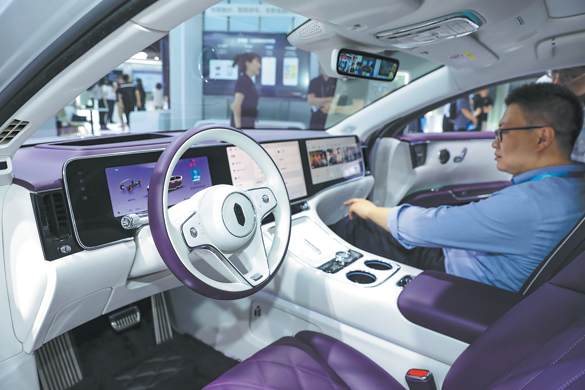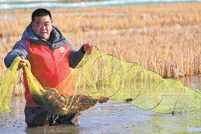Parenting by proxy

When grandparents raise children, questions arise about looking after one's own
The Wuhan Morning Post reported recently that a 63-year-old woman was diagnosed with depression from the stress of caring for her grandchildren, igniting debate on social media over the ethics of young people foisting their child-raising responsibilities on their aging parents.
According to the report, the woman, surnamed Li, moved to Wuhan three years ago from her hometown in Shandong province to help raise her grandson, and then her new granddaughter. Li also did all the housework while her daughter was at work, and slept with the grandson at night, when she would be frequently awakened by the child. After her diagnosis, Li told doctors that she "lived in constant fear of accidents" or illnesses that the child could suffer under her watch, for which she could be blamed by her daughter or son-in-law.
In 2013, researchers from Case Western Reserve University who conducted long-term studies on grandmothers in various family situations, from full-time caregivers to those not involved in parenting their grandchildren at all, concluded that grandmothers who are grandchildren's primary caregivers need help dealing with depression and family strain. Still, the Wuhan report claims that 60 to 70 percent of children under 2.5 years in China are cared for by their grandparents, as well as 40 percent of children older than 3 years.
Given the lackluster support for mental illness in China, these figures are indeed alarming. However, netizens - who, it must be noted, tend to be young - found the matter far from clear-cut, with many reluctant to simply pile on the parents for their entitlement (though there was still plenty of that):
One of the comments online was:
老人帶孩子只是分擔一些, 很多成年人都把這個當成了老年人的責任. 憑什么帶大了你,還要帶大你的孩子?
Lǎorén dài háizi zhǐshì fēndān yīxiē, hěnduō chéngnián rén dōu bǎ zhège dàngchéngle lǎonián rén de zérèn. Píng shénme dài dàle nǐ, hái yào dài dà nǐ de háizi?
Elderly people raise children to share the burden, but many adults regard it as the elders' duty. Why should your parents be obliged to raise your children after having raising you?

However, many empathize with young couples have no choice because they have to work full-time:
自己的孩子自己帶,根本就不現實, 現在的年輕人, 工作壓力很大, 不上班, 一個人養家又不行. 買房, 養娃, 連最基本的衣食都保證不了!
Zìjǐ de hái zǐ zìjǐ dài, gēnběn jiù bù xiànshí, xiànzài de niánqīng rén, gōngzuò yālì hěn dà, bù shàngbān, yīgè rén yǎngjiā yòu bùxíng. Mǎifáng, yǎng wá, lián zuì jīběn de yīshí dōu bǎozhèng bùliǎo!
It's no longer realistic to raise one's children oneself. Young people today have tremendous pressure at work and can't afford to live on a single income - it's not enough to buy a house, raise a child, or even to buy food or clothing.
年輕人不是不想帶, 是要上班. 一個人的工資不夠開支. 不過老年人帶確實累, 都不容易.
Niánqīng rén bùshì bùxiǎng dài, shì yào shàngbān. Yīgè rén de gōngzī bùgòu kāizhī. Bùguò lǎonián rén dài quèshí lěi, dōu bù róngyì.
It's not that young people don't want to raise children, they have to work, …though it's true that this is exhausting for the elderly, nobody has it easy.
Some have pointed out that the entitlement goes both ways: There are young adults who were pressured by parents to have children:
父母催生的時候就是你生了我幫你帶. 真的生了各種矛盾各種埋怨. 人老了根本就沒精力. 生出來還是自己的責任. 所以別因為父母一句話不想生都生了. 還是自己有足夠的能力再說.
Fùmǔ cuīshēng de shíhòu jiùshì nǐ shēngle wǒ bāng nǐ dài. Zhēn de shēngle gè zhǒng máodùn gè zhǒng mányuàn. Rén lǎole gēnběn jiù méi jīnglì. Shēng chūlái háishì zìjǐ de zérèn. Suǒyǐ bié yīnwèi fùmǔ yījù huà bùxiǎng shēng dōu shēngle. Háishì zìjǐ yǒu zúgòu de nénglì zàishuō.
When parents pressure you to have children, they promise to help you raise them; then afterwards they complain. It's true that the older they get the less energy they have to raise children. … So don't have children unless you're able to raise them, no matter what parents say.
Finally, some point out that without a total overhaul of society's attitudes on child-rearing, all that this debate accomplishes is to put more pressure on women:
你不生孩子人家罵你自私. 你生了孩子在家照顧說你吃白飯不賺錢. 你生了孩子給父母帶說你不孝順. 所以, 以后不要有女性這種生物了, 給你們添堵了.
Nǐ bù shēng háizi rénjiā mà nǐ zìsī. Nǐ shēngle háizi zàijiā zhàogù shuō nǐ chī báifàn bù zhuànqián. Nǐ shēngle háizi gěi fùmǔ dài shuō nǐ bù xiàoshùn. Suǒyǐ, yǐhòu bùyào yǒu nǚxìng zhè zhǒng shēngwùle, gěi nǐmen tiāndǔle.
You're selfish if you don't have a child; you're lazy if you stay at home to raise your children; if you ask your parents to raise them you're unfilial. Why does this organism known as "woman" exist except to be criticized?
又是自己的孩子自己帶, 又要女人獨立, 請問女人是超人嗎? 全職在家要面臨被丈夫拋棄, 被社會拋棄的結局, 出去工作又要被說對孩子不負責. 那哪家公司允許女人帶著娃上班?
Yòu shì zìjǐ de hái zǐ zìjǐ dài, yòu yào nǚrén dúlì, qǐngwèn nǚrén shì chāorén ma? Quánzhí zàijiā yào miànlín bèi zhàngfū pāoqì, bèi shèhuì pāoqì de jiéjú, chūqù gōngzuò yòu yào bèi shuō duì háizi bù fùzé. Nà nǎ jiā gōngsī yǔnxǔ nǚrén dàizhe wá shàngbān?
Women are supposed to raise their own children and also be independent. Are they superwomen? Full-time housewives who get cheated on by their husbands get looked down on by society. Work, and people say that's irresponsible to their children. What company allows women to bring their kids to work?
看了一圈評論, 都在說女人帶孩子還是外婆帶孩子還是奶奶帶, 都是喪偶式家庭嗎? 爸爸死了嗎?
Kànle yī quān pínglùn, dōu zài shuō nǚrén dài hái zǐ huán shì wàipó dài hái zǐ huán shì nǎinai dài, dōu shì sàng'ǒu shì jiātíng ma? Bàba sǐle ma?
I have looked through the comments, which are all debating whether the children should be raised by mother or grandmother. Are they all from widowed families? Is the father dead?
These generational and gendered attitude divides are unlikely to find easy bridges. More applicable in this situation, but less discussed, may be the cost and other stresses of living in China's cities, the lack of affordable child care options, the pressure on the current generation of young adults to succeed, and the lack of mental health services for the elderly (or anybody). Meanwhile, Ms Li recently got some help - of a sort: Now that the grandson has started kindergarten, she's only responsible for the new baby. The boy is going to live with his other grandparents.
Courtesy of The World of Chinese; www.theworldofchinese.com.cn
The World of Chinese

(China Daily European Weekly 09/22/2017 page23)
Today's Top News
- China to apply lower import tariff rates to unleash market potential
- China proves to be active and reliable mediator
- Three-party talks help to restore peace
- Huangyan coral reefs healthy, says report
- PLA conducts major drill near Taiwan
- Washington should realize its interference in Taiwan question is a recipe it won't want to eat: China Daily editorial






























